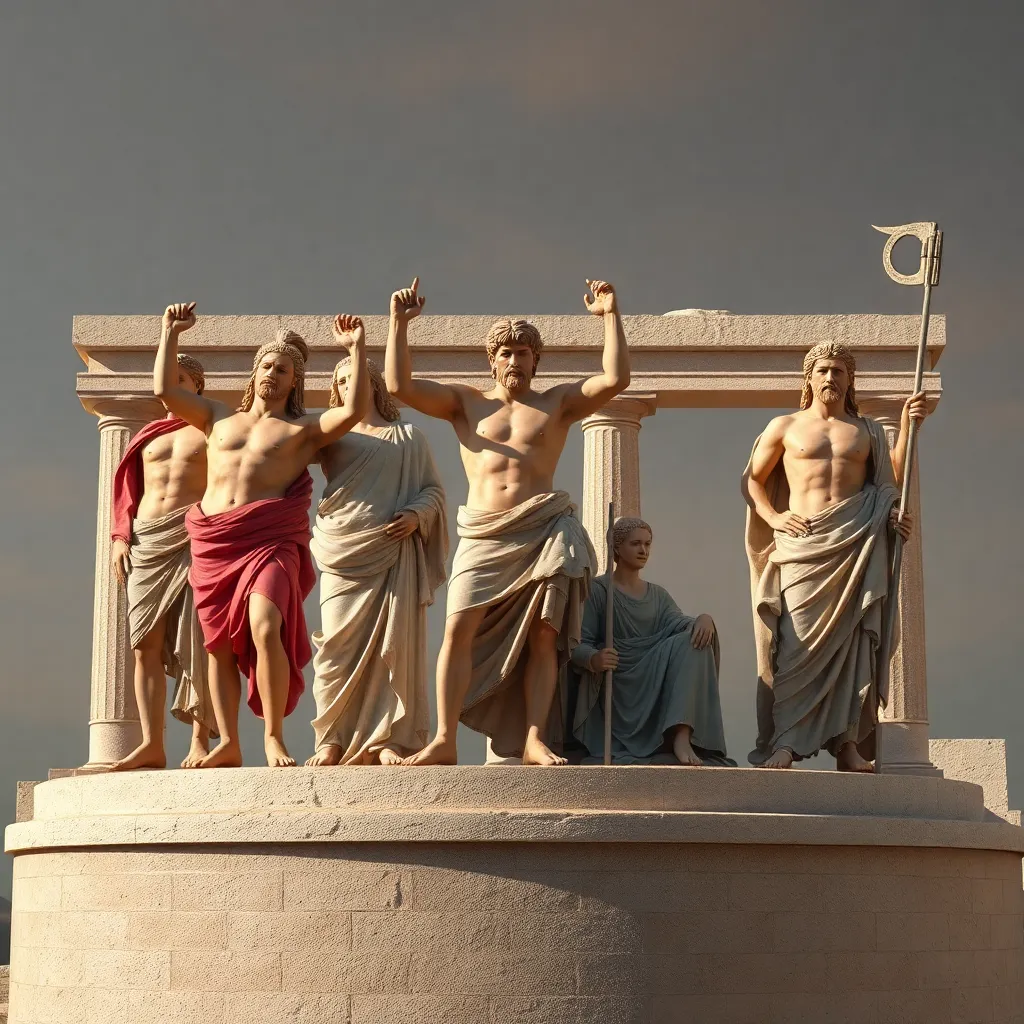The Olympians and Their Role in the Development of Greek Science
I. Introduction
Greek mythology is a rich tapestry of stories, characters, and moral lessons that have influenced Western culture for centuries. At the heart of this mythology are the Olympians, a group of twelve principal gods and goddesses who resided on Mount Olympus. These deities played a crucial role in ancient Greek culture, embodying various aspects of human experience and natural phenomena.
The Olympians were not just figures of worship; they were central to the Greeks’ understanding of the world around them. Their stories and characteristics had a profound impact on various fields of knowledge, paving the way for scientific inquiry in ancient Greece. The thesis of this article posits that the Olympians significantly influenced the development of Greek science through their associations with various fields of knowledge.
II. The Olympians: A Brief Overview
The twelve Olympian gods and goddesses are:
- Zeus – King of the gods, god of the sky and thunder
- Hera – Queen of the gods, goddess of marriage and family
- Athena – Goddess of wisdom and warfare
- Apollo – God of the sun, music, and prophecy
- Aphrodite – Goddess of love and beauty
- Hermes – Messenger of the gods, god of trade and communication
- Demeter – Goddess of agriculture and fertility
- Poseidon – God of the sea and earthquakes
- Artemis – Goddess of the hunt and wilderness
- Dionysus – God of wine and festivity
- Ares – God of war
- Hephaestus – God of fire and craftsmanship
Each Olympian was associated with specific domains, embodying various aspects of life and nature. Their myths and legends shaped Greek thought, influencing not just religion but also philosophy and science.
III. Athena: Goddess of Wisdom and Strategy
Athena, the goddess of wisdom, strategy, and warfare, was a symbol of rational thought and intellectual pursuit. She was revered by philosophers and scholars, and her contributions to the development of scientific methodologies were significant.
Athena’s influence can be seen in the works of prominent philosophers such as:
- Socrates – Emphasized the importance of knowledge and critical thinking.
- Plato – Founded the Academy, promoting philosophical inquiry.
- Aristotle – Developed the scientific method based on observation and reasoning.
Her emphasis on strategy and rationality laid the groundwork for early scientific inquiry and the pursuit of knowledge.
IV. Apollo: God of Knowledge and Prophecy
Apollo, the god of knowledge, arts, and prophecy, was deeply connected with the pursuit of knowledge. His association with the Oracle of Delphi made it a significant site for scientific inquiry, where questions about the future and the natural world could be explored.
Apollo’s contributions extended to mathematics and astronomy, where he was revered as a source of enlightenment:
- Mathematics – The Pythagoreans, followers of Pythagoras, integrated Apollo’s principles into their mathematical theories.
- Astronomy – Ancient Greeks looked to the stars, attributing celestial phenomena to Apollo’s influence.
Through Apollo’s guidance, many sought to understand the universe, blending art and science seamlessly.
V. Hermes: The Messenger of the Gods and Patron of Communication
Hermes, known as the messenger of the gods, played a crucial role in the development of language and communication, which are fundamental to scientific progress. His influence extended to various domains, facilitating the exchange of ideas and knowledge.
The significance of trade and communication in scientific advancement can be seen in:
- Language – The evolution of symbols and written language, enabling the recording of scientific observations.
- Trade – The exchange of goods led to the sharing of agricultural and botanical knowledge.
Hermes acted as a bridge between different fields of knowledge, fostering interdisciplinary collaboration among scholars.
VI. Demeter: Goddess of Agriculture and the Natural Sciences
Demeter, the goddess of agriculture, had a profound impact on the natural sciences. Her influence on agricultural practices allowed early Greeks to observe and study the natural world, leading to significant scientific discoveries.
Demeter’s role in the study of botany and ecology was pivotal, as she represented the cycles of life:
- Seasonal Cycles – The changing seasons informed early agricultural practices and observations in nature.
- Botanical Studies – The cultivation of crops led to early scientific inquiry into plant life and ecosystems.
Her teachings laid the groundwork for understanding the natural world, fostering a sense of stewardship and inquiry that would shape future scientific endeavors.
VII. Poseidon: God of the Sea and Earthquakes
Poseidon, the god of the sea and earthquakes, was influential in the early studies of marine science and navigation. His domain provided a rich source of observation and inquiry for ancient Greeks.
Understanding natural phenomena through the lens of mythology allowed early scientists to develop foundational concepts in geology and oceanography:
- Marine Science – The study of tides, currents, and marine life was inspired by Poseidon’s control over the seas.
- Geological Studies – Earthquakes and land formations were linked to Poseidon’s power, prompting investigations into the earth’s structure.
Poseidon’s mythological role helped Greeks make sense of their environment, fostering a desire to explore and understand natural laws.
VIII. Conclusion
The Olympians played a crucial role in shaping the development of Greek science. Each deity contributed to various fields of knowledge, inspiring early thinkers and scientists to explore the natural world through observation and inquiry.
The lasting legacy of these mythological figures is reflected in the way they shaped scientific thought, intertwining mythology with empirical inquiry. The intersection of divine influence and human curiosity continues to resonate in the study of science today.
In conclusion, the Olympians not only represented the forces of nature and human experience but also served as catalysts for scientific advancement in ancient Greece, leaving a profound impact on the course of intellectual history.




